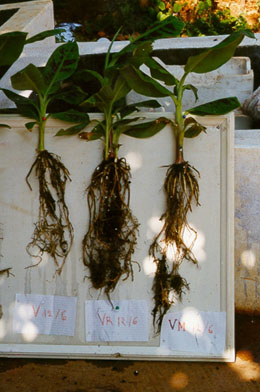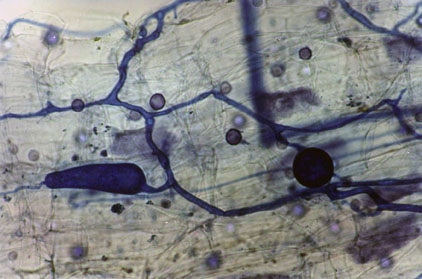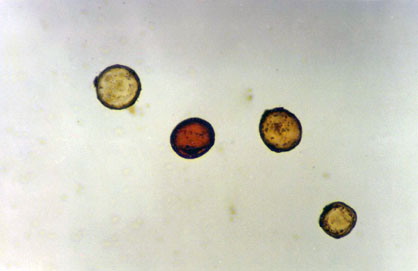 The world's population continues to grow while the amount of arable land steadily decreases, lost to desertification, overuse and poor agricultural management. Aggresive farming techniques in much of the developing world are often detrimental to the soil profile, reducing the soil's fertility and disrupting its ecosystem. Farmers are faced with the need to increase their yield per hectare while coping with a continual decrease in soil quality. Mycorrhizal fungi can help to alleviate these pressures. They form a symbiotic relationship with plants, increasing the effective root surface area several-fold and helping to manage the rhizosphere. The fungal partner acquires fixed carbon from the host plant and responds by enhancing the plant's ability to take up nutrients from the soil, reducing its response to stress and limiting its exposure to root pathogens.
The world's population continues to grow while the amount of arable land steadily decreases, lost to desertification, overuse and poor agricultural management. Aggresive farming techniques in much of the developing world are often detrimental to the soil profile, reducing the soil's fertility and disrupting its ecosystem. Farmers are faced with the need to increase their yield per hectare while coping with a continual decrease in soil quality. Mycorrhizal fungi can help to alleviate these pressures. They form a symbiotic relationship with plants, increasing the effective root surface area several-fold and helping to manage the rhizosphere. The fungal partner acquires fixed carbon from the host plant and responds by enhancing the plant's ability to take up nutrients from the soil, reducing its response to stress and limiting its exposure to root pathogens.
 The Farm began researching mycorrhiza in 1996. We worked to isolate and identify mycorrhizal fungi from various regions in Morocco; we also conducted experiments to measure the effect of the mycorrhizal relationship on the performance of several crops, including banana, pineapple, sudan grass and cotton. Although innoculation with mycorrhizae always resulted in improved plant performance and stress resistance, our trials indicate that this increase is not significant enough to make mycorrhiza cost-effective on rich soils. Mycorrhizae are most effective when used for the recovery and rehabilitation of marginal land; they provide significant advanages to young plants in nurseries. The Farm is working to establish an innoculation program for all of our nursery production. Please get in touch if you would like to discuss our work with mycorrhizae.
The Farm began researching mycorrhiza in 1996. We worked to isolate and identify mycorrhizal fungi from various regions in Morocco; we also conducted experiments to measure the effect of the mycorrhizal relationship on the performance of several crops, including banana, pineapple, sudan grass and cotton. Although innoculation with mycorrhizae always resulted in improved plant performance and stress resistance, our trials indicate that this increase is not significant enough to make mycorrhiza cost-effective on rich soils. Mycorrhizae are most effective when used for the recovery and rehabilitation of marginal land; they provide significant advanages to young plants in nurseries. The Farm is working to establish an innoculation program for all of our nursery production. Please get in touch if you would like to discuss our work with mycorrhizae.

 Our reserach in this field was made possible by a USAID cost-sharing program mediated by Development Alternatives, Inc. The funds provided by this program allowed us to establish a research laboratory for our work with mycorrhiza. The Farm would like to extend its thanks and appreciation to USAID and DAI for their assistance with this program.
Our reserach in this field was made possible by a USAID cost-sharing program mediated by Development Alternatives, Inc. The funds provided by this program allowed us to establish a research laboratory for our work with mycorrhiza. The Farm would like to extend its thanks and appreciation to USAID and DAI for their assistance with this program.

